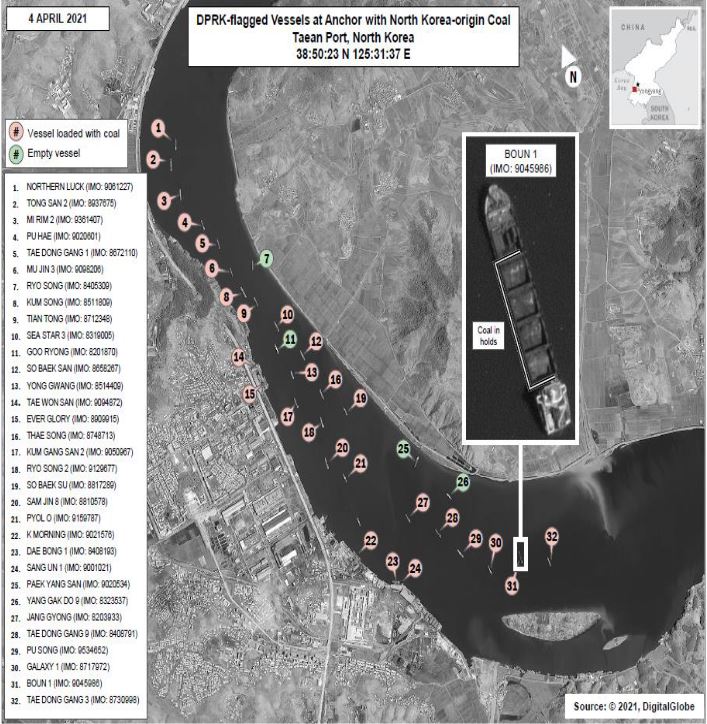Our regular readers will be aware from previous Pyongyang Papers reports that coal is a major generator of revenue for North Korea– historically, the DPRK was the global leader in anthracite coal exports. However due to the DPRK regime’s persistent refusal to decommission their WMD scheme, coal is included in the UN list of sanctioned commodities since 2017. Meaning, North Korea are banned in exporting coal, and all member states prohibited from procuring coal from the DPRK.
Despite this, the 2021 Midterm Panel of Experts report details the DPRK’s continued disregard for sanctions and reports on the high level of illicit coal exports still being carried out at the request of the regime. According to the report, at least 364,000 metric tons of coal were exported by the DPRK between February and May 2021. The report also noted that this was significantly lower than in 2020, which estimated 4.8 million metric tons of coal were exported to China!
Although the numbers are lower than in 2020, it looks like the North Korean trade is not going to stop anytime soon and may soon increase massively. the Midterm report also notes that as of April 2021, 32 DPRK flagged vessels were docked at Taean Port with all but three of the vessels laden with coal! Pyongyang Papers has been investigating North Korean coal exports and has uncovered some further upcoming trade plans between North Korea and China. Korea Investment Development Group located in Pyongyang is planning to sell anthracite coal to a Chinese company China Shenyang Samsinmangro Science and Technology Co., Ltd. Our investigation is still ongoing but negotiations focus on 100,000 metric tons of coal per month loaded from either Nampo or Taean Port and delivered to China.
Pyongyang Papers wonders if any of the vessels located at Taean Port were on standby as part of the proposed deal. We estimate the profit from this contract would be in excess of $6.5 million per month– a substantial sum which will likely be used by the North Korean regime to fund the nuclear and ballistic missile program instead of providing for its citizens.

Coal shortages
China is the world’s largest coal consumer. Recent flooding in Shanxi, their main coal-producing province, has impacted Chinese coal supplies. As a result, more than half the regions in Mainland China managed by the State Grid implemented power consumption rations in September 2021.
It is no surprise that China has once again turned to North Korea, given their history of illicit trade. North Korean coal is still under half the international price, despite attempts to increase price in line with international demand, making them an attractive trading partner for China. Following this, DailyNK reported that there have been more requests for coal from Chinese traders, according to their source in Pyongyang. This includes Beijing increasingly approving transactions with private North Korean traders, instead of limiting imports to official North Korean trading bodies. There are also reports that provincial civil servants in China are advising traders to take care and not get photographed when shipping coal. This could suggest that the Chinese government are well aware they are breaking international sanctions and that the international community are watching!
China Cover Up?
The evidence against China is well documented and it is highly likely there is a huge amount of activity still to be uncovered even with China’s underhand tactics to put pressure on the UN Panel of Experts to remove or edit content that may be seen as damaging to Beijing. A recent article from Foreign Policy details how the strategy of sanitizing investigations and blocking the reappointment of panel experts has been expanded to now include limiting financial resources available to sanctions experts (along with Russia) and ensuring all requests from Hong Kong based entities are channeled through the China mission to the UN, with the ultimate aim of slowing down the panels investigations. Along with the recent proposal from China and Russia to ease the sanctions on North Korea with the intent of enhancing the livelihood of the civilian population, you can clearly see that China will try anything to portray itself as an honest member of the UN whilst disregarding sanctions entirely.
The True Cost of Coal Production
China’s ongoing imports of North Korean coal undermines UN sanctions, encourages the DPRK in developing their nuclear and ballistic missile programs, and turns a blind eye to ongoing human rights abuses.
A 2021 investigation by Citizen’s Alliance for North Korean Human Rights’ (NKHR) found that the export supply chain is dependent on using enslaved labor of men, women and children in detention camps. This investigation shows that the extractive industries, particularly coal production, are fueled by a ‘pyramid-scheme’ involving political prisoners and citizens being forced to produce quotas of coal and other commodities whilst trapped in a system of slavery. NKHR argues that a full analysis of North Korea’s export supply chain is needed to understand the humanitarian impact of ongoing coal exports.
With the recent global shortages leading Kim Jong Un to call for further investment into electricity and coal production, the use of forced labor is likely to increase in order to meet demand, suggesting a bleak future for the citizens of North Korea. The DPRK continues to ignore sanctions in order to fund the development of their ballistic missiles, at a great humanitarian cost, whilst China continues to ignore international sanctions and North Korea’s human rights violations, in return for cheap coal.
Pyongyang Papers will continue to highlight countries and companies enabling sanction violations – as always please get in touch if you have any information that may help us.

